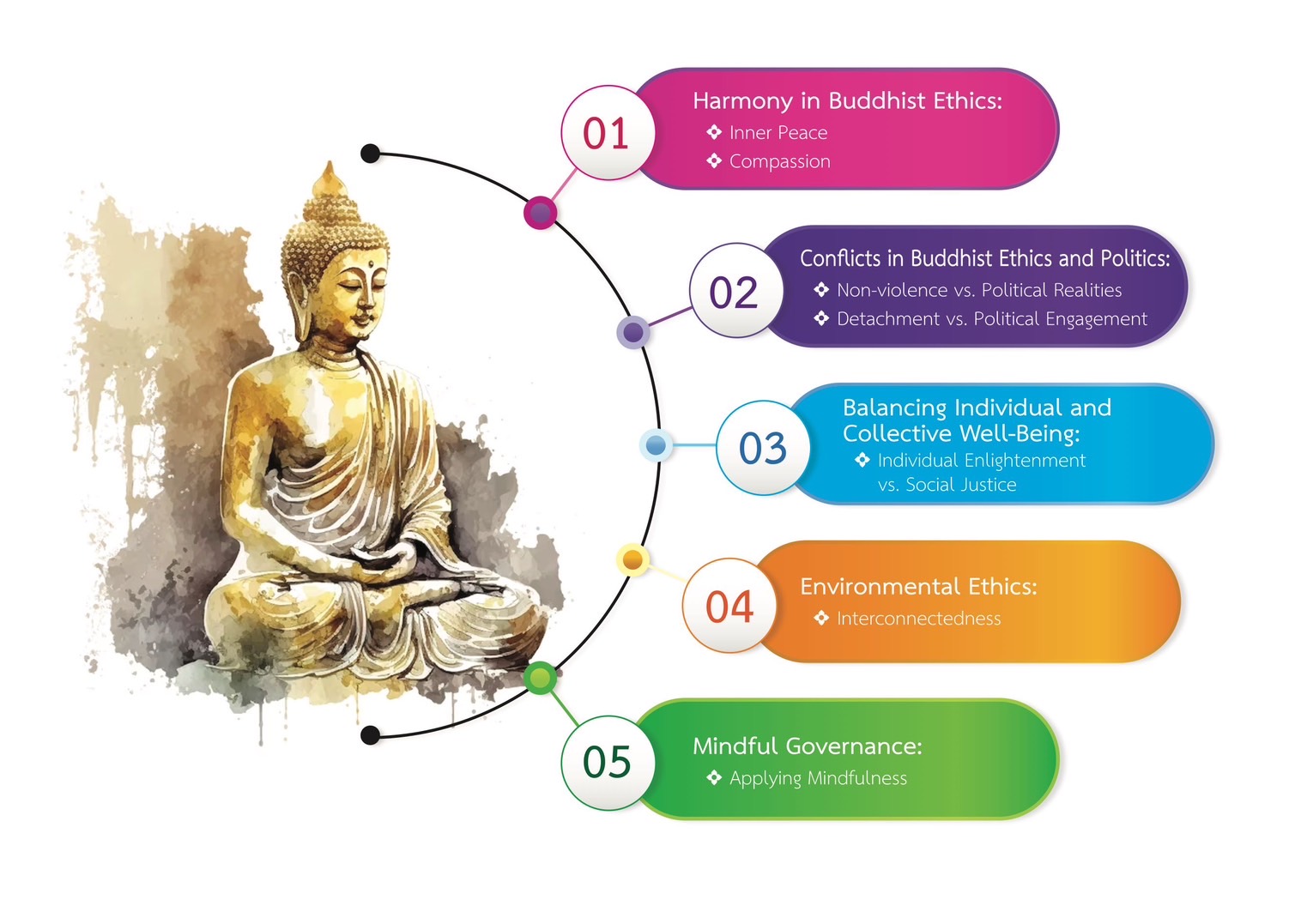HARMONY AND CONTRADICTION: EXPLORING THE INTERSECTION OF BUDDHIST ETHICS AND POLITICAL ETHICS
Keywords:
Harmony, Contradiction, Buddhist Ethics, Political EthicsAbstract
Background and Objective: The convergence of Buddhist ethics and political ethics occurs when there is a complex interplay between spiritual principles and practices of good governance. Buddhist ethics are based on basic concepts, such as non-harm and compassion. This creates a unique moral perspective when woven into the fabric of political ethics, which must contend with administrative complexities. The power dynamics and social justice interactions present a wide range of possibilities and challenges. Scholars explore how Buddhist principles can inform political decision-making. It emphasizes the potential for building unity and character development among political leaders. This interdisciplinary examination not only reveals opportunities for adaptation but also reveals ethical tensions and quandaries at the intersection of Buddhist ethics and political ethics. Therefore, this article aims to explore the harmony and contradictions between Buddhist ethics and political ethics.
Methodology: The research used rigorous methods with a literature review and critical analysis of documentaries to shed light on the interplay between Buddhist ethics and political ethics. This approach attempted to present a comprehensive understanding of the harmonious intersections and potential conflicts that marked the relationship between these ethical frameworks through a synthesis of diverse perspectives. This research aimed to facilitate an exploration of various sources and perspectives, providing a holistic perspective on the complex dynamics at the intersection of Buddhist ethics and political ethics. It provided a more thorough insight into the complex interconnections and challenges.
Main Results: The results of the research found that harmony between Buddhist ethics and political ethics, included adjusting the principle of harmlessness, emphasizing mutual sympathy, being mindful in decision-making, principles of good governance and social justice, and adherence to the truth. Conflicts between Buddhist ethics and political ethics included conflict in Non-Harm Principles, compassion and political realism, sanity and political expediency, ethical governance and political realism, and truth and political rhetoric.
Involvement to Buddhadhamma: This research article is involved in Applied Buddhism and categorized within "Buddhism for social benefits," which applies Buddhist principles in the context of modern science and society. It aims to bridge the gap between traditional Buddhist principles and contemporary challenges for cultivating a more compassionate, mindful, and ethical world that responds to the complex needs of today's society.
Conclusions: There was a noticeable correspondence between Buddhist ethics and political ethics. This was evident in general principles, such as non-harm, compassion, mindfulness, good governance, and truth. However, inherent conflicts arose in some areas, such as disagreements over seemingly benign principles. The difficulty of reconciling humanist valued with the practicality of political decision-making and the potential tension between the ethical ideals of governance and the practical demands of political realism. The inclusion of truth in political rhetoric had also become a matter of debate. These observations highlighted the complex and subtle dynamics that characterized the intersection between Buddhist ethics and political ethics. It emphasized the need to take a careful and careful approach when navigating the interplay between these two ethical frameworks.
References
Anālayo, B. (2003). Satipaṭṭhāna The Direct Path to Realization. Windhorse Publications.
Arendt, H. (1998). The Human Condition. University of Chicago Press.
Aristotle. (2000). Nicomachean Ethics (J. A. K. Thomson, Trans.). Penguin Classics.
Beauchamp, T. L. & Bowie, N. E. (1983). Ethical Theory and Business. (2nd ed.). Prentice-Hal.
Dahl, R. A. (1991). Democracy and Its Critics. (2nd ed.). Yale University Press.
Gethin, R. (1998). The Foundations of Buddhism. Oxford University Press.
Harvey, P. (2000). An Introduction to Buddhist Ethics: Foundations, Values, and Issues. Cambridge University Press.
Keown, D. (1992). The Nature of Buddhist Ethics. Macmillan.
Lama, D. & Cutler, H. C. (1998). The Art of Happiness. A Handbook for Living: Penguin.
Machiavelli, N. (1992). The Prince. Oxford University Press.
MacIntyre, A. (1984). After Virtue: A Study in Moral Theory. University of Notre Dame Press.
Nussbaum, M. C. (2013). Political Emotions: Why Love Matters for Justice. Harvard University Press.
Nye, J. S. (1967). Corruption and Political Development: A Cost-Benefit Analysis. American Political Science Review, 61(2), 417-427.
Rawls, J. (1971). A Theory of Justice. Harvard University Press.
Rawls, J. (1996). Political Liberalism. Columbia University Press.
Walzer, M. (1973). Political Action: The Problem of Dirty Hands. Philosophy & Public Affairs, 2(2), 160-180.

Downloads
Published
How to Cite
Issue
Section
License
Copyright (c) 2024 Journal of Buddhist Anthropology

This work is licensed under a Creative Commons Attribution-NonCommercial-NoDerivatives 4.0 International License.








